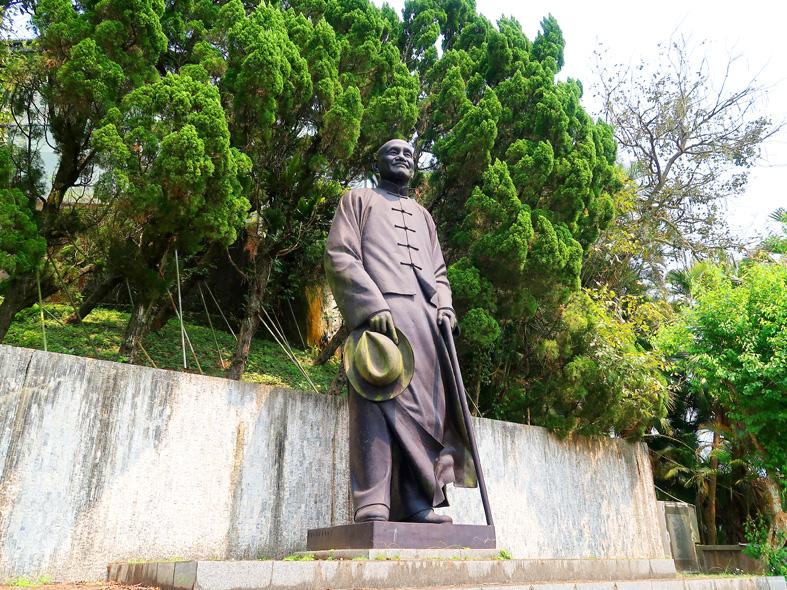As of Wednesday, 403 authoritarian symbols had been removed or were scheduled for removal, while 537 were still in place, Transitional Justice Commission data showed yesterday, although the Ministry of National Defense, Ministry of Education and the Veterans Affairs Council had yet to report on such symbols under their jurisdiction.
More than 40 statues or other authoritarian symbols have been excised since August last year, after the central government removed an additional 11 and local governments eliminated 32, data showed.
However, the status of the 410 items managed by the ministries of defense and education is unclear.

Photo: Chen Yu-fu, Taipei Times
Of the 537 symbols still remaining in public areas, 84 are managed by the central government and 453 by local governments, although the figure does not include those managed by the three agencies.
Kaohsiung, as well as Miaoli, Yunlin, Hualien and Penghu counties, also had yet to respond to the commission.
The Presidential Office manages four statues, all of which are at former president Chiang Ching-kuo’s (蔣經國) mausoleum in Taoyuan’s Dasi District (大溪), and have not been removed, the data showed.
The Legislative Yuan has agreed to remove the bronze statue of former president Chiang Kai-shek (蔣介石) from its service center in Taichung, but as it is located on the grounds of the former Taiwan Provincial Consultative Council, officials are deliberating whether it should be considered a cultural asset, the commission said.
The Examination Yuan is also to change the names of three locations and remove two bronze statues under its jurisdiction, it added.
Of the 14 authoritarian symbols managed by the Ministry of the Interior, nine statues are to be removed and five names changed, including Zhongzheng Hall (中正堂) on the Pratas Islands (Dongsha Islands, 東沙群島), which has already been renamed, it said.
Two statues managed by the Ministry of Economic Affairs have yet to be removed, including a large bronze statue of Chiang Kai-shek in a long robe and magua at Taoyuan’s Shihmen Reservoir (石門水庫), which is inside a paid scenic area, the report said.
Meanwhile, the Veterans Affairs Council has moved five of the 61 authoritarian symbols under its jurisdiction to storage or the National Property Administration, and is awaiting approval for them to be removed permanently, the commission said.
A bronze statue of Chiang Kai-shek remains at the National Palace Museum in Taipei, as do two administered by the Council of Agriculture, it added.
The Ministry of Culture manages 13 statues, one of which is at the Green Island White Terror Memorial Park, while the rest are at the Chiang Kai-shek Memorial Hall in Taipei, it said, adding that 12 are still in place.
The commission said that it this month plans to submit recommendations for dealing with the memorial hall.
In addition to the Veterans Affairs Council’s efforts, Taipei has agreed to remove 40 authoritarian symbols, while all three of Chiayi City’s bronze statues have been eliminated, a commissioner told reporters, vowing to continue negotiating with central government agencies and local governments to remove those remaining.

Taiwan is stepping up plans to create self-sufficient supply chains for combat drones and increase foreign orders from the US to counter China’s numerical superiority, a defense official said on Saturday. Commenting on condition of anonymity, the official said the nation’s armed forces are in agreement with US Admiral Samuel Paparo’s assessment that Taiwan’s military must be prepared to turn the nation’s waters into a “hellscape” for the Chinese People’s Liberation Army (PLA). Paparo, the commander of the US Indo-Pacific Command, reiterated the concept during a Congressional hearing in Washington on Wednesday. He first coined the term in a security conference last

Prosecutors today declined to say who was questioned regarding alleged forgery on petitions to recall Democratic Progressive Party (DPP) legislators, after Chinese-language media earlier reported that members of the Chinese Nationalist Party (KMT) Youth League were brought in for questioning. The Ministry of Justice Investigation Bureau confirmed that two people had been questioned, but did not disclose any further information about the ongoing investigation. KMT Youth League members Lee Hsiao-liang (李孝亮) and Liu Szu-yin (劉思吟) — who are leading the effort to recall DPP caucus chief executive Rosalia Wu (吳思瑤) and Legislator Wu Pei-yi (吳沛憶) — both posted on Facebook saying: “I

A court has approved Kaohsiung prosecutors’ request that two people working for Democratic Progressive Party (DPP) Legislator Lin Dai-hua (林岱樺) be detained, as a probe into two cases allegedly involving her continues. The request was made on Friday, after prosecutors raided Lin’s two offices and the staffers’ residences, and questioned five on suspicion of contravening the Anti-Corruption Act (貪汙治罪條例). The people included the directors of Lin’s Daliao (大寮) and Linyuan (林園) district offices in Kaohsiung, surnamed Chou (周) and Lin (林) respectively, as well as three other staffers. The prosecutors’ move came after they interrogated Lin Dai-hua on Wednesday. She appeared solemn following

Sung Chien-liang (宋建樑), who led efforts to recall Democratic Progressive Party (DPP) Legislator Lee Kun-cheng (李坤城), was released on bail of NT$80,000 today amid outcry over his decision to wear a Nazi armband to questioning the night before. Sung arrived at the New Taipei District Prosecutors’ Office for questioning in a recall petition forgery case last night wearing a red armband bearing a swastika, carrying a copy of Adolf Hitler’s Mein Kampf and giving a Nazi salute. Sung left the building at 1:15am without the armband and covering the book with his coat. Lee said today that this is a serious